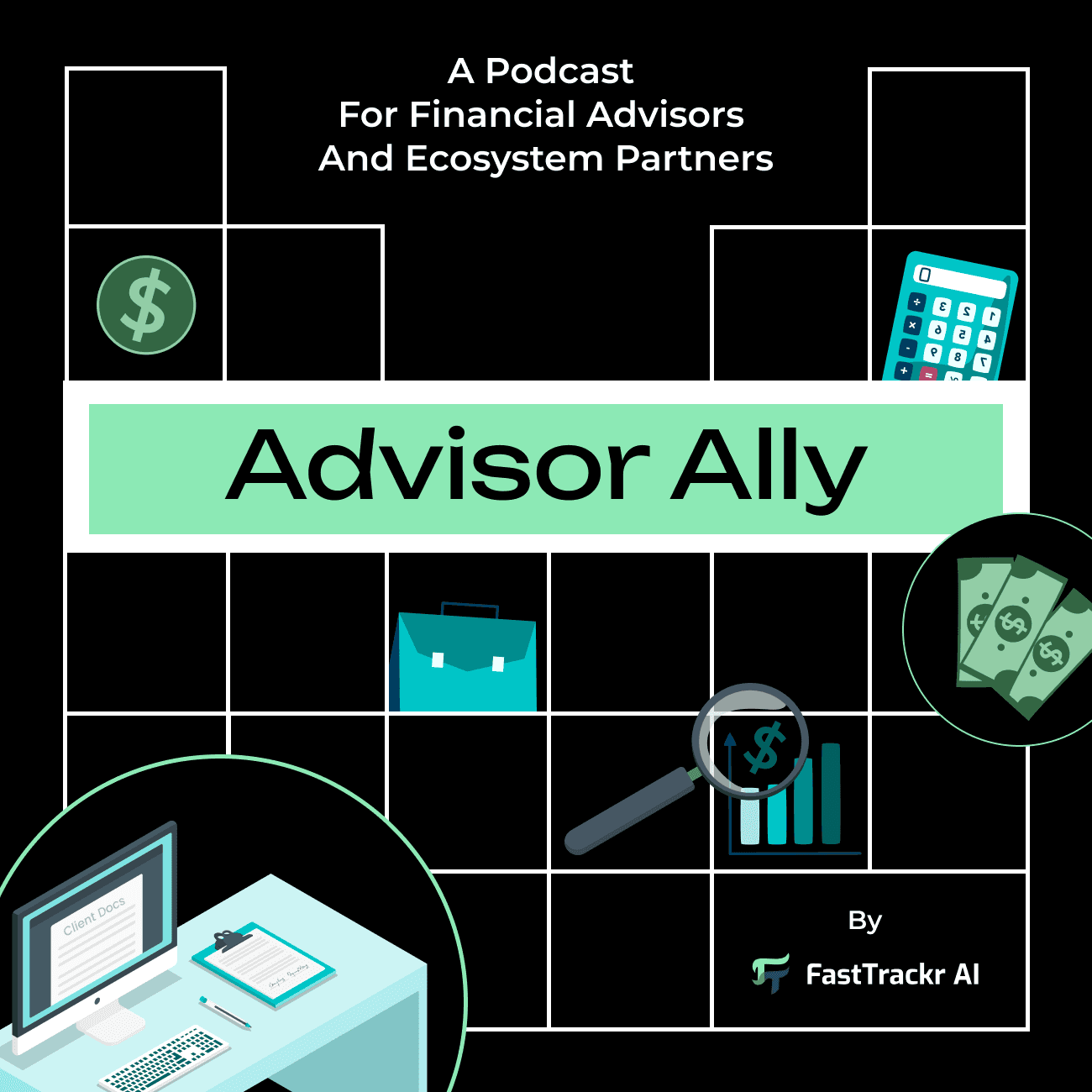
Sep 30, 2025
The Rise of Advice-Only Planning: A Conversation with Steven Fox
The financial planning profession has long struggled with the question of how to charge for advice. Should advisors earn commissions from product sales? Should they charge a percentage of assets under management? Or should planning be billed directly, as a retainer or flat fee? Each approach has tradeoffs. Each also shapes who is able to access financial advice.
In a recent episode of the Advisor Ally podcast, host Vineet Mohan sat down with Steven Fox, CFP®, EA, to explore these challenges and opportunities. SteveAIn is a Marine Corps veteran who discovered financial planning at San Diego State University, launched Next Gen Financial Planning straight out of college, and eventually sold that firm to his employees. Today he is building AdviceOnly, a platform designed to make it easier for advisors to serve clients without managing assets or selling products.
What emerges from Steven’s story is both personal and structural. It is about one advisor’s unusual journey from the military into planning. It is also about the broader shifts in the profession toward models that are more accessible, more sustainable, and more aligned with why many advisors entered the field in the first place: to help people.
From the Marine Corps to Money Mentor
Steven’s background is not the traditional path into financial planning. After nearly a decade in the Marine Corps, he enrolled at San Diego State University, determined to be the first in his family to complete college. Finance seemed like the natural fit, but at first he assumed he would work in corporate finance or as an analyst.
That changed when a guest speaker introduced his student finance group to the world of personal financial planning. For Steven, the appeal was immediate. It was far more satisfying to imagine helping real people navigate financial decisions than to optimize the balance sheet of a large corporation. Fortunately, San Diego State offered a financial planning program that prepared students to sit for the CFP exam directly out of undergrad.
Steven dove in, working part time as a paraplanner at MetLife while completing his coursework. He quickly realized, however, that the traditional industry path was not aligned with the clients he wanted to serve.
Founding Next Gen Financial Planning
Rather than pursue a job at an established firm, Steven launched his own RIA upon graduation. His motivation was clear: he wanted to work with people like himself and his peers, individuals in their twenties and thirties who were being largely ignored by traditional advisory firms.
The industry at the time viewed this demographic as unprofitable. They had little or no investable assets, but often carried significant student loan debt. As Steven recalls, “For a while, we literally had more debt under management than assets.” That did not deter him. In fact, he found it energizing to serve clients at a stage where planning could have a significant lifetime impact.
The early years were difficult. Building a firm from scratch, without the leverage of AUM fees, required persistence. But over time, Next Gen grew, added staff, and eventually reached the point where Steven could sell the business to his employees.
Flat Fees Versus AUM
A key to Next Gen’s model was rejecting the industry standard of charging a percentage of assets under management. Instead, Steven implemented a flat-fee structure. Clients answered a series of questions about their financial complexity, marital status, home ownership, equity compensation, real estate holdings—and the firm’s online calculator generated a pricing estimate.
This approach created two advantages. First, it was transparent and fair, reflecting the actual work required rather than the size of an account. Second, it lowered the barrier to entry for younger clients who wanted advice but had little in the way of investable wealth.
Next Gen offered both ongoing annual service packages and short-term projects. The latter proved particularly important. As Steven explains, “If you are asking someone to make a big commitment, they should know what it is going to look like at the end. Offering shorter projects helped them understand what planning feels like without the risk of a full engagement.”
Life Triggers That Drive Demand
One of the most interesting insights from Steven’s experience is that clients rarely wake up one day simply “wanting a financial plan.” Instead, they tend to seek advice after a life event that adds complexity. Common triggers include a new job with equity compensation, getting married, having a child, buying a house, or receiving an inheritance.
At those moments, financial questions feel urgent and personal. People may experiment with DIY research, but as balances grow and stakes increase, the limits of internet advice become clear. These inflection points are when planners can have the greatest impact.
Launching AdviceOnly
After selling Next Gen in 2024, Steven turned his attention to a structural problem he had observed. Many advisors are passionate about planning but reluctant business owners. They want to work with clients, not build compliance systems, manage payroll, or assemble tech stacks.
Yet until recently, the only way to run an advice-only practice was to launch a standalone RIA. The result was a growing number of “accidental entrepreneurs” who found themselves burdened by tasks unrelated to financial planning.
AdviceOnly was designed to solve this problem. For a flat fee of $18,000 per year, advisors can affiliate under the platform’s RIA. The platform handles compliance, technology, and infrastructure, leaving advisors free to focus on serving clients. As Steven notes, “We are not reinventing the concept of corporate RIAs, but we are the only one focused solely on advice-only planning.”
Technology, AI, and the Human Element
The conversation also explored the role of technology and AI in planning. Steven has witnessed the explosion of advisor tech tools over the past decade and appreciates their power to streamline operations. At the same time, he is cautious. Categories are increasingly overlapping, making selection difficult, and the risks of AI hallucinations or data breaches cannot be ignored.
He remains convinced that the human element of planning will not be replaced. Clients rely on empathy, judgment, and trust, qualities that software cannot replicate. Technology should enable advisors, not distract from the client relationship.
The Business Case for Advice-Only
While many discussions of advice-only models focus on ethics, Steven emphasizes the business advantages:
Lower client acquisition costs, because the demand is client-driven.
Immediate revenue collection, rather than waiting for AUM billing or commission trails.
Simpler compliance requirements.
Higher trust and retention, since clients see planning as the core value.
A vastly larger potential client base, extending beyond the 2–3 percent of households with significant investable assets to nearly everyone with financial complexity.
In Steven’s view, advice-only is not just good for clients. It is a better business model for advisors as well.
Life Beyond Planning
The conversation closed on a personal note. Steven is raising two young children and recently returned to marathon training. He jokes that he is still trying to prove to his wife that he is a 20-something Marine, even as injuries suggest otherwise.
These glimpses remind us that advisors, too, are navigating the balance of work, family, and personal growth, the same challenges faced by the clients they serve.
Conclusion
Steven Fox’s journey highlights the changing face of financial planning. His path from the Marine Corps to Next Gen to AdviceOnly reflects a profession in transition, from product sales to planning, from asset-based minimums to inclusive flat fees, and from entrepreneurial isolation to platform support.
The broader lesson is that advice-only planning is no longer just an ethical argument. It is becoming a sustainable and scalable business model that aligns advisor incentives with client needs.
For advisors considering their own future, or for clients curious about where the profession is headed, Steven’s story is both inspiring and instructive. The advice-only movement may represent not just a niche, but the next evolution of financial planning itself.






